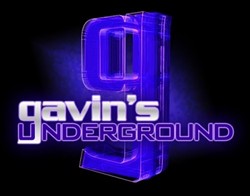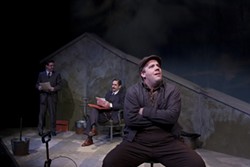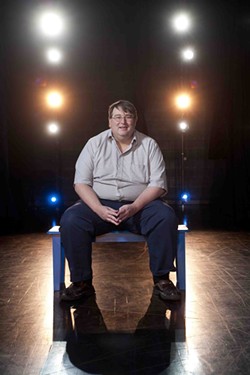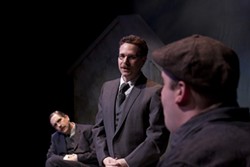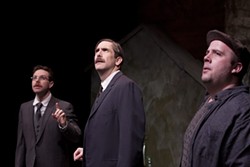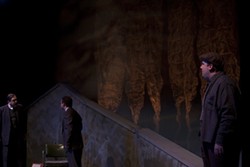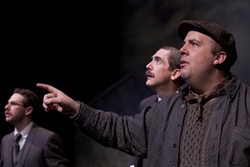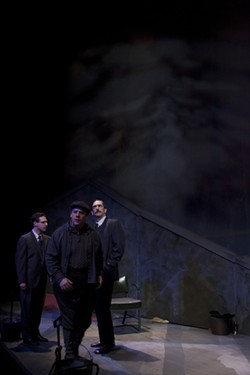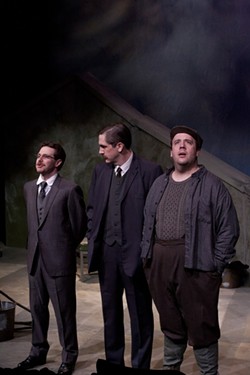Thursday, February 20, 2014
Plan-B Theatre: Clearing Bombs
Posted By Gavin Sheehan on February 20, 2014, 7:00 PM
Continuing the #SeasonOfEric, PLan-B Theatre brings out the next of the Samuelsen plays with Clearing Bombs, set to kick off tonight at the Rose Wagner. --- This production focuses on two economists on the rooftop of Kings College Chapel in Cambridge as the two discuss the economic future while clearing away German incendiary bombs at the height of World War II. Today we chat with the playwright (who also served as director) and all three actors about the production, as it runs until March 2. (All photos courtesy of Plan-B Theatre.)
Kirt Bateman, Mark Fossen, Jay Perry & Eric Samuelsen
Gavin: Hey everyone! First thing, tell us a little bit about yourselves.
Kirt: I’m nearing the big 4-0. I have a lot of hair where I don’t want it and none where I really do want it. I’m married (never thought I’d say that) to a pretty terrific Gaysian. I have a kid (really, really never thought I’d ever say that) that I adore. I was born and raised in Utah on a dairy farm; I consequently learned how to guide a heifer during birth of a calf before I even knew how babies were made.
Mark: I live in the Fort Union area with my talented actress wife April, my two girls, and our toy poodle Mac.
Jay: I grew up in Salt Lake and live downtown with my wife Daisy and my chatty cat Chester. I love living in Utah. I love the artistic community here and everything our great outdoors have to offer.
Eric: Nothing new to report. Just writing, blogging, watching the Olympics.
Gavin: What have you all been up to over the past year in local theatre?
Kirt: I was privileged to be in another Plan-B #SeasonOfEric production, Nothing Personal, with the unspeakably talented April Fossen. It was torturous.
Mark: I don’t think I realized it until trying to answer this question, but it’s been a pretty busy year. Over the past 12 months, I’ve directed Our Town and Death Of A Salesman at The Grand, As You Like It%uFFFDat Davis Arts Council, and acted in SLAM at Plan-B and Rosencrantz & Guildenstern Are Dead at the U.
Jay: I just wrapped up Plan-B's Peter & The Wolf tour last month with a performance with Salt Lake Symphony (after 33 performances with Gina Bachauer to 10,000 students in Salt Lake and Davis Counties) and, before that, Stravinsky's A Soldier's Tale with Plan-B and the Nova Chamber Music Series, both of which were absolutely amazing to do. I'm in awe of professional musicians and sharing the stage with an orchestra is something I wish everyone could experience. Earlier this season I performed in Eric Samuelsen's Radio Hour Episode 8: Fairyana. I was also in my first show with Pygmalion Productions, A Night With The Family, and taught at the Egyptian Youth Theatre where I also directed A Midsummer Night's Dream. I recently began working full-time in teaching and administration at the University of Utah Youth Theatre and assistant directed UUYT's most recent mainstage production, Crow and Weasel at Kingsbury Hall.
Eric: The #SeasonOfEric has been the most fun I've ever had in my life. I can't tell you how much I've enjoyed it. To recap: The Script-In-Hand Series reading of my translation of Ibsen's Ghosts was a terrific experience. I love the play, and working with Christy Summerhays as Mrs. Alving was just brilliant. And the translation really worked, I think. I tried to capture Ibsen's comedy - yes, there is some! - and I heard just enough appalled laughs to make me think his particular brand of satire still has some bite and relevance. I found the experience of watching Nothing Personal to be quite shocking. Jerry's vision for the play exceeded my own, I think, and I sat there in the theatre in a state of shock, blown completely away by the performances and the production. And the extraordinary work of all the artists who created%uFFFDRadio Hour Episode 8: Fairyana%uFFFDmade that whole experience magical. I had never worked in that format before, and I was enthralled by the possibilities of it. I was also worried that the play wasn't as funny as I'd hoped it would be. I need not have been concerned - the Plan B audience was its usual astute self. Now I'm working with a dream cast of actors in Clearing Bombs. So much fun.
Gavin: Eric, how did the idea for Clearing Bombs come about?
Eric: My wife, on a trip to the library, found Nicholas Wapshott's "Keynes Hayek: The Clash that Defined Modern Economics" in the New Book section. On a whim, she checked it out for me, and on a whim, I read it. I had always previously avoided economics, for what seemed to me a perfectly sensible reason: economics involves numbers, and numbers are not my friend. But Wapshott's book was enthralling on a level I'd never previously experienced. And he described this night on the roof that Keynes and Hayek shared during World War II. And I knew immediately that that had to be my next play.
Gavin: For those who don't know or understand the period, give us a little information about wartime Britain and the strife they were going through at the time.
Eric: Well, 1942 was a time fraught with peril. The main aerial attacks on Britain, the time we call the Blitz, had died down a bit by '42. The really intense bombing had been from Sept. '40 to the summer of '41. But that's not to say that there weren't still bombings, and air raids, and buildings destroyed and civilians killed. The British people had survived the worst of it by '42, and there was a greater optimism about the war effort. Mr. Bowles has three sons serving, each in a different branch of the service, and by design, they're in the three most crucial areas of the war. One son is in the Royal Navy, says Mr. Bowles, in a destroyer on the Russian convoy. Of course, the bulk of the fighting in WWII was in Russia - 90% of German divisions were fighting on the Eastern front - and the Russians were in constant need of resupply. That job was handled by the British navy in '42, convoying weapons and armaments from factories in the US to Russia. A second of Mr. Bowles' sons is with Alexander, in North Africa - fighting to open a second front. And Mr. Bowles' third son is an aircraftman - keeping the planes flying that were either fighting German bombers, or on bombing runs themselves. For the Brits, there were shortages of food and strict rationing of petrol and any other supplies that might be used in the war effort. But there was also tremendous courage and optimism and patriotism, all of which Mr. Bowles reflects.
Gavin: How was it for you putting this type of piece together with topics like war, intellectual theory and economics, all within 90-minutes?
Eric: Well, there were two challenges, which had to be dealt with sequentially. First of all, I had to do the requisite research in both the period and history and personalities of these two men, Keynes and Hayek, and their ideas, and of course, economics generally. Which, as I've said, is not a field in which I had previously immersed myself. But then, second, I had to convey those ideas and that history in a way that could be accessible and dramatically viable, exciting. I do sometimes have a tendency to show off: "Look at me, look at all the difficult things I know!" So it just took draft after draft. Early drafts were read by my son, an economist - he was very helpful. Tucker Samuelsen, currently in grad school at the U.
Gavin: What made you want to direct the play as well?
Eric: Well, Jerry asked me to. He had just directed Nothing Personal, and when he asked me if I would be interested, I was initially a bit reluctant. Not that I don't love the play; I do. But I had concerns about my physical stamina -worried that my illness might get in the way of doing what I wanted to with the play. Directing is hard work. That was also my wife's concern. But I thought about it, and to be honest, I also prayed about it. And I had a strong sense, while praying, that it would be okay, as did my wife. And now, I'm thrilled to be directing. Though I do wonder, at times, what that playwright bloke was thinking, all those long speeches about macroeconomic theory? Is he nuts?
Gavin: To the cast, what were your first thoughts on the play when you read it?
Kirt: “Eric Samuelsen is one of the smartest, most interesting people I know,” was my first thought. My other reactions were more along the lines of how much I enjoyed and related to the character of Mr. Bowles. I sort of think of myself as fairly-ill-informed-and-poorly-read, but a relatively-smart-every-day-Joe kinda guy. I’m basically playing myself if I were living in the 40s in London…and straight…and much braver…and enjoyed beer.
Mark: I fell in love immediately. I love plays about big ideas, and this tackled some of the major issues confronting us today with passion and emotion. Eric has such a gift for tackling the Big Idea—digging into history (in Amerigo) or economics—and then not only explaining the idea but telling us why it really matters.
Jay: Wow, that's a lot of big words. My brain hurts.
Gavin: Talk about how you came to be playing these roles.
Kirt: I read the part of Mr. Bowles for the Plan-B Playwrights Lab reading and subsequently was cast to play the role.
Mark: Jerry asked the three of us read the play together for the Plan-B Playwrights Lab back in September 2012 and I leapt at the chance. Working at Plan-B on a script by a brilliant playwright and working with two of the best actors I’ve had the privilege to act with? Sold.
Jay: I was involved in the table reading for the Director's Lab. I spent some time working on the German dialect and had made some notes in my script which all sort of went out the window when we actually sat down to read it. Enough of it stuck that I was able to get a good feel for the speech patterns. Kirt and Mark were both amazing in that reading and it just felt great from the start.
Gavin: How has it been for each of you finding your roles and developing your characters?
Kirt: It has been incredibly interesting; especially considering that the period surrounding World War II is one of the most fascinating to me historically. I really discovered my love for this time period when I dove into research when I was cast in a production of The Diary Of Anne Frank at Old Lyric Repertory Company 15 years ago. WWII is such a singular moment in modern history. A punctuation and then shift in the world of money, power, human rights, acts of war, acts of cruelty and conversely acts of bravery and humanity. It seems that the moniker of “the greatest generation” is appropriate. I’m baffled and humbled and incredibly interested in it and, until I started to work on this script, I had no idea that it was really all about economics. Anyway, I am very lucky that I, as an actor, was able to learn about the economics of the play the exact same way that Mr. Bowles does: by listening to Eric's versions of “Keynes” and “Hayek” talk about their respective chosen economic paradigms and how each sees the world. That, along with Eric’s unending river of knowledge. In any case, my first step was to try to learn the correct dialect—which was harder than I thought it would be and I’m not sure all that successful, but I am trying. Then my task is to listen and somewhat moderate a fascinating “debate” by two incredible figures in history, economics, and world power.
Mark: Keynes is far smarter than I, and a much better teacher. Trying to get on top of how to portray that brilliance has been the big challenge. Part of it came in the physicality, seeing some photos and drawings of Keynes as well as descriptions of his voice and presence. No one would mistake me for him, but I hope to try and capture some of what he was like.
Jay: There's been a lot of time sitting in my office reading, memorizing and listening to dialect tapes. Tapes? I guess I mean MP3's. Dialect MP3's doesn't really have that ring to it. Eric has this incredible gift for drawing out brilliantly accessible characters. Hayek has been revealing himself to me every day in little pieces and I've grown to admire the actual man deeply. It's been a crash course in economics, that's for sure. I can't get enough... I see the principles we talk about in the play everywhere I look. It's kinda crazy.
Gavin: Considering the content, how much do you believe it reflects on our society today?
Kirt: The debate in this play is absolutely the same debate among the conservative and liberal parties of the United States of today. Same! In fact, that’s why it is so interesting and powerful. And one of the wonderful facets of Eric’s rich, rich writing is that both sides are equally compelling. Even if you choose a side - and we all do, and Eric has - the way in which Eric has constructed the arguments lends itself to empathy for, if not totally understanding of, the opposing view. For instance, being the blue-state-loving-bleeding-heart-nut-job-liberal that I am, I naturally felt more connected by John Maynard Keynes’ arguments and theories. However, there is a moment in the play where there is no question that Frederick Hayek’s discussion of freedom both in the realm of government control and personal choice reverberates for both me and Mr. Bowles. I think what I’ve learned in this play will help me temper and inform the debates I sometimes have with my very Republican father, whom I definitely disagree with politically but love and adore with my whole heart.
Mark: Keynes vs. Hayek is the debate we’ve been having over these past few years, world-wide: Obamacare, the debt ceiling, European Union austerity, bailouts. We’ve been talking about the role of government, and the balancing act between freedom and the safety net. It’s immensely illuminating, and I think all of us would say we see the news a little differently now after immersing ourselves in this.
Jay: Hayek has a line, "Economics is what people do." What I've picked up is that the science of economics encompasses all of human activity and is intertwined deeply in all of human behavior. There is no separation between modern humanity and the field of macroeconomics. Or something like that.
Eric: Actually, I think that writing and working on this play has caused me to look at the world entirely differently. Economics is everything, it's everywhere. It's about the decisions we make when doing our grocery shopping, or buying a car, or what's on TV, or why certain movies get made and how they get promoted. And, of course, it's about politics. Writing this play helps me understand conservatives much more deeply than ever before. While also committing me all the more fiercely to progressive values.
Gavin: What are all of your thoughts going into opening night?
Kirt: “Yikes!” and “This is going to be interesting.” and “I hope none of my British friends tell me when they are coming, as I’m sure that’ll be the night that I completely lose my dialect and start talking like an alien.”
Mark: I think it’s an amazing play that will really spark conversations, and I look forward to sharing it with audiences.
Jay: It's very exciting to finally give the play to the audience and I'm as excited as ever for this one. Plan-B is an amazingly supportive company and Jerry, Cheryl, Jesse, Randy, Kirt, Mark, Eric and Jen have made this experience exceptional. I'm excited for the team to play the big game.
Eric: "Please don't let my inadequacies as a director prevent this play, which I love, come fully to life."
Gavin: What can we expect from all of you over the rest of the year?
Kirt: This Christmas I'll be in Julie Jensen's new play at Plan-B. Until then I’m planning on spending some quality time with my son and by quality time I mean working my ass off to keep up with him.%uFFFD
Mark: Theatrically, nothing’s concrete yet in the immediate future — and that’s great. I’m looking forward to a break to recharge my batteries, and spend time with family and friends. I’l also be graduating with my much-delayed BA (from the U) in May, so that will be accomplishment enough. And I will be appearing with my wife April in a new play by Melissa Leilani Larson next season at Plan-B.
Jay: There are a few projects in the works. I'm looking forward to Matthew Ivan Bennett's Radio Hour Episode 9: Grimm next season with Plan-B and I'll be doing a lot of work with the UUYT. My wife Daisy and I are planning to visit our family in England this summer and I'm looking forward to getting up into the mountains more this year. See you on the trail!
Eric: There's one more play in the #SeasonOfEric: 3%uFFFDruns March 27-April 6! So fun. Also, obviously, I'm working on something new!
Gavin: Aside from the obvious, is there anything you'd like to promote or plug?
Kirt: A summer of great concerts at the Davis Arts Council in Layton
Mark: We have an abundance of riches when it comes to local theatre, so take advantage of it! There’s so much good stuff coming up over the next few months at Plan-B and other local theaters, it would be a shame to let it pass you by.
Jay: Check out Youth Theatre at the U!
Eric: My blog!
| Follow Gavin's Underground: |
On Topic...
-
Film Reviews: New Releases for April 19
The Ministry of Ungentlemanly Warfare, Abigail, The Beast, Hard Miles, Sasquatch Sunset and more
- Apr 19, 2024
-
Film Reviews: New Releases for April 12
Civil War, Escape from Germany, Coup de Chance, Hundreds of Beavers, La Chimera, Sting
- Apr 11, 2024
-
Film Reviews: New Releases for April 5
Monkey Man, The First Omen, Wicked Little Letters, Girls State, Scoop, Exhuma
- Apr 4, 2024
- More Gavin's Underground » More Culture »
More by Gavin Sheehan
-
Gavin's Underground: End Of An Era
Nine and a half years of local entertainment blogging comes to an end.
- May 26, 2017
-
Torris Fairley
A quick interview with the up-and-coming SLC-based comedian.
- May 25, 2017
-
Cirque Asylum
A look into the dance school teaching unique forms of aerial arts.
- May 24, 2017
- More »


